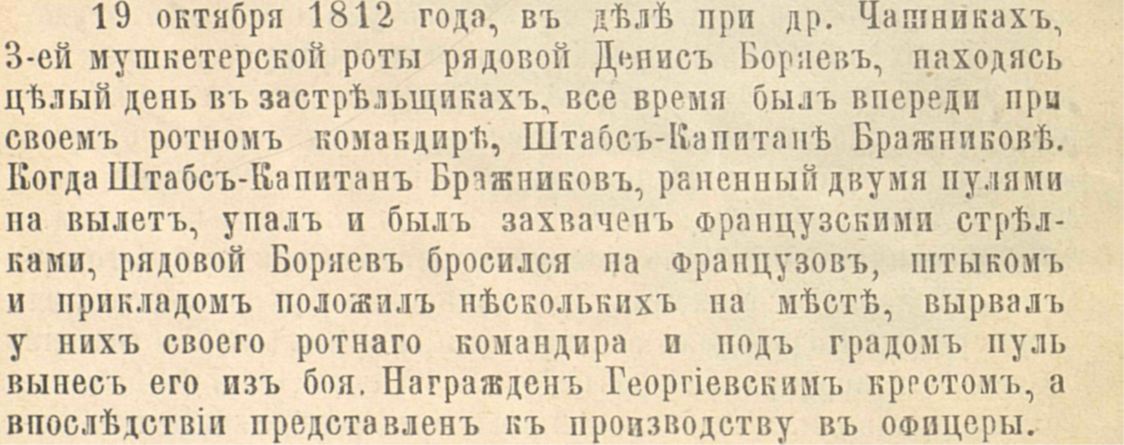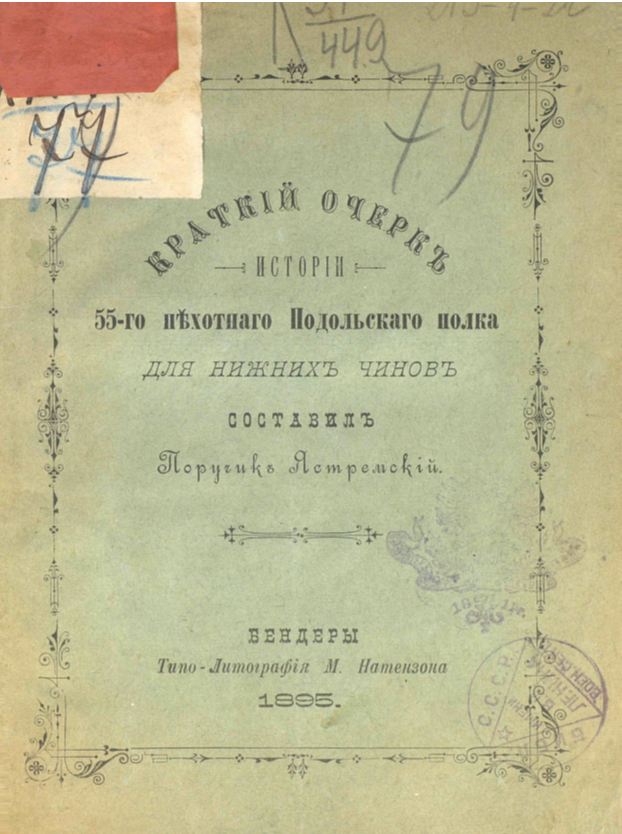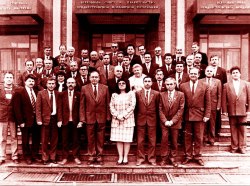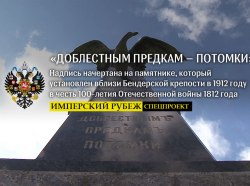The monument was built with funding of the soldiers and officers of the 55th Podolsk Infantry Regiment. The Regiment took the most active part in the exile of the Great army of Napoleon from Russia what is marked at the inscription on the back of the monument: "The participation of the Podolsk Regiments in battles 1812 on the river Ushach October, 8; at the village Chashniki October, 19; at the villages Stanishche, Hrabraya and Smolyantsy November 2".
Monument to the 55th Podolsk Infantry Regiment in Bendery
The central element of the composition on the regimental signs of the Podolsk Regiment is the anchor. This reminds that the Regiment came from the fleet. It began as Rochensalmsky Infantry Garrison Regiment formed on January 5, 1798. Its first soldiers were seamen under command of the Major General Bolotnikov. And it had to be used as it was specified in the imperial decree, "on the sea and on the rowing vessels". So, in fact, it was the marines regiment. The first serious test of the Rochensalmsky Infantry Garrison was the Russo-Swedish war of 1808−1809. It was delivered to the places of fights by the ships. On February 11, 1808, Rochensalmsky Infantry Garrison fought at the capture of Lovis fortress, and then at a Svartgolm's siege and storm. Just before Napoleon's invasion to Russia, in 1811 the regiment was renamed in the Podolsk Infantry Regiment. And even being already an overland regiment, it was thrown by the sea to the district of Riga under the command of the colonel Andrey Timofeyevich Maslov.
Regimental sign. Photo: wikipedia.org
As it was said above, the Podolsk Infantry Regiment took part at the Second battle near Polotsk on the river Ushacha in Belarus on October 6-8.
The Bavarian corps of the Marshal Saint-Cyr resisting to the troops of the Lieutenant General Pyotr Vitgenshtenstein nearly escaped being surrounded. Napoleon's troops had to leave Polotsk and burned all the boats through the Western Dvina (Ushach is its inflow), but two and a half thousand Bavarians did not manage to transport and were forced to give up. Gouvion Saint-Cyr was wounded in a leg. For the capture of Polotsk Wittgenstein was promoted to the General. It is remarkable that the St. Petersburg National Militia also was involved in the battle except for regular parts of the Russian army.
Privates, World War I, the 55th Podolsk Infantry Regiment, Bendery. Photo: www.bessarabia.ru
Loss of Polotsk threatened the supply of Napoleonic troops, so it had to be returned. Wittgenstein did not know about the arrival of the Marshal Victor corps, and therefore it was decided to attack. The vanguard of the Russian troops under command of the Prince Lev Yashvil captured about 800 French, Bavarians and Spaniards at the town Chashniki on October 19 and from them found out about the attack. Moreover, the group of the Colonel Vasily Garpe directed to Vitebsk and forced local garrison under command of the General Pyuzhe to capitulate. 400 more French were taken, prisoner. The warehouses located in the city became the Russian trophies.
In the fight at Chashnikov the soldier of the Podolsk Regiment Denis Boryaev excelled. In 1895 in Bendery, the book of the Lieutenant Yastremsky "Short Sketch on History of the 55th of Podolsk Infantry Regiment for the Lower Ranks" was published. The author describes a soldier's feat in the following way:
After the defeat at Chashnikov and capture of Vitebsk Napoleon even more insistently demanded from Victor to reject the Russian troops for the Western Dvina. In fights at settlements Hrabraya and Stanishche under the pressure of superior forces of the opponent the Russian troops were forced to leave the positions. The Podolsk Regiment covered the derogation. It could based at the village Smolyantsa and beaten off all the attacks of the pressing opponent. Unfortunately, in a fight at
Hrabraya the Commander of a Regiment Andrey Maslov was wounded and temporarily replaced by the Major Stolman. For fights under Hrabraya, Stanishchami and Smolyantsa about 724 lower ranks of the Podolsk Regiments were awarded by a St George's Cross.
In this small sketch, we mentioned only the first pages of this part of the Russian army which are directly connected with the history of our region. The 55th Podolsk Regiment meanwhile participated in many campaigns (the Crimean war of 1853−1856, Russo-Turkish war 1877−1878, Russo-Japanese wat 1904−1905, World War I in which the Regiment participated in the well-known Brusilov Offensive). It was repeatedly awarded, for example with the banners of St. George and Silver Pipes.
Short Sketch on History of the 55th of Podolsk Infantry Regiment for the Lower Ranks
Today in Bendery there are celebrations on the regimental holiday of the 55th Podolsk Infantry. The tradition stopped in 1917 was renewed in 2007. Next year it will be 220 anniversary. So we will continue our story.
Anton Egorov















